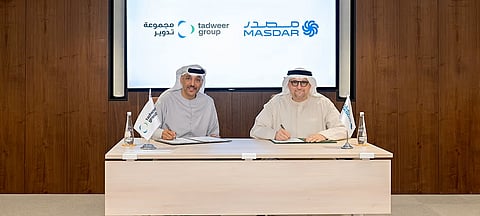Abu Dhabi Advances Circular, Low-Carbon Aviation with First Commercial-Scale Waste-to-SAF Project
Masdar and Tadweer Group have signed a landmark Joint Development Agreement to deliver Abu Dhabi’s first commercial-scale Waste-to-Sustainable Aviation Fuel (SAF) plant — a project that cements the UAE’s position as a global leader in circular economy innovation and low-carbon aviation.
Following a successful feasibility study, the initiative will convert approximately 500,000 tons of municipal solid waste and biomass annually into SAF. The breakthrough lies in the hybrid pathway:
Green hydrogen produced via renewable-powered electrolysis
Waste gasification converting waste into syngas
Proven chemical processes upgrading syngas into aviation-grade SAF
Driving the UAE’s Energy Transition
This project is not only about fuel — it’s about reshaping entire value chains. With aviation contributing more than 18% of the UAE’s GDP (IATA, 2023), decarbonizing the sector is crucial. SAF can cut lifecycle emissions by up to 80%, making it one of the most impactful levers in aviation sustainability.
The initiative directly advances major national roadmaps and policies, including:
UAE General Policy for SAF
Abu Dhabi’s Low-Carbon Hydrogen Policy
National Hydrogen Strategy
Abu Dhabi Climate Change Strategy
UAE Net Zero by 2050 Strategic Initiative
Unlocking Waste as a High-Value Clean Energy Resource
For Tadweer Group, the partnership reinforces its mission to turn waste into economic and environmental opportunity. The plant will play a central role in Tadweer’s target to divert 80% of Abu Dhabi’s waste from landfills by 2030, creating a new ecosystem around waste valorization, green hydrogen, and renewable fuels.
Ali Al Dhaheri, Managing Director and CEO of Tadweer Group, emphasized that the project demonstrates “the incredible potential of waste” to support national decarbonization and global sustainability leadership.
A New Hub for Sustainable Aviation Fuel in the Region
Once operational, the plant will supply multiple regional and international markets, positioning Abu Dhabi as a strategic SAF hub for one of the world’s busiest aviation corridors.
Mohamed Jameel Al Ramahi, CEO of Masdar, noted that the project will “advance the UAE’s leadership in sustainable aviation” while delivering real emissions reductions at scale.
A Model for Global Clean Energy Innovation
By integrating clean energy, hydrogen, waste management, and sustainable transport, the Masdar–Tadweer project shows how cities can redesign infrastructure for a net-zero future. It sets a regional benchmark — and potentially a global example — for turning today’s waste into tomorrow’s climate solutions.
Abu Dhabi is not just producing greener fuel; it is building the blueprint for the sustainable aviation economy of the future.


